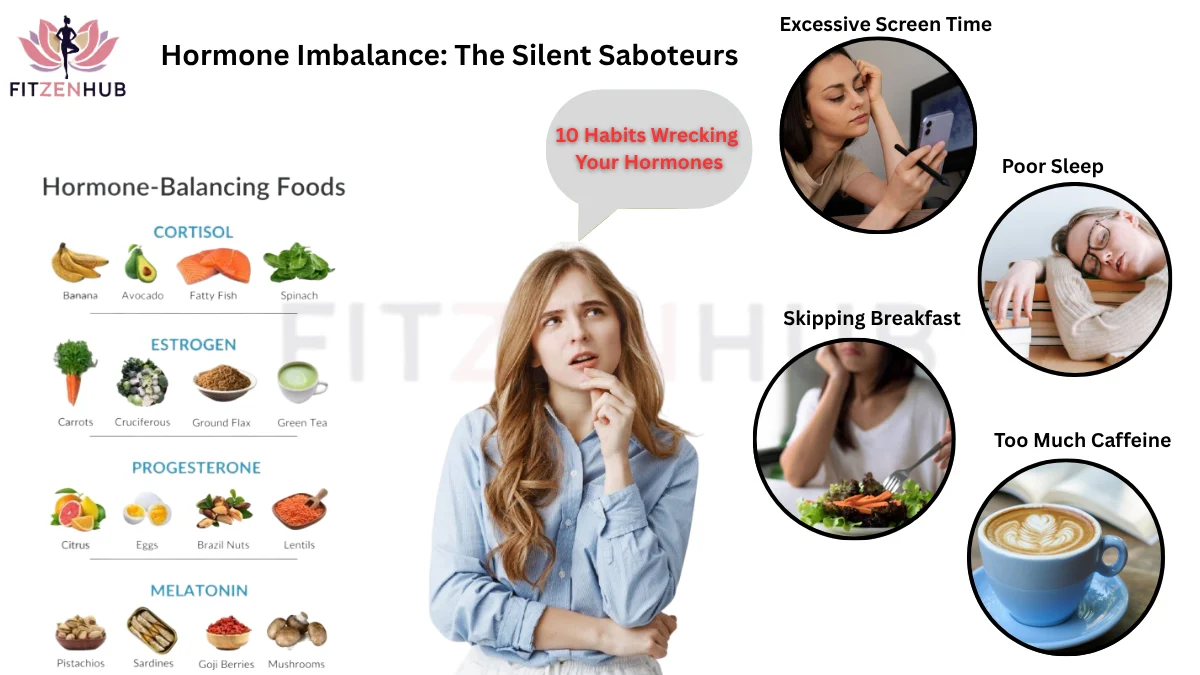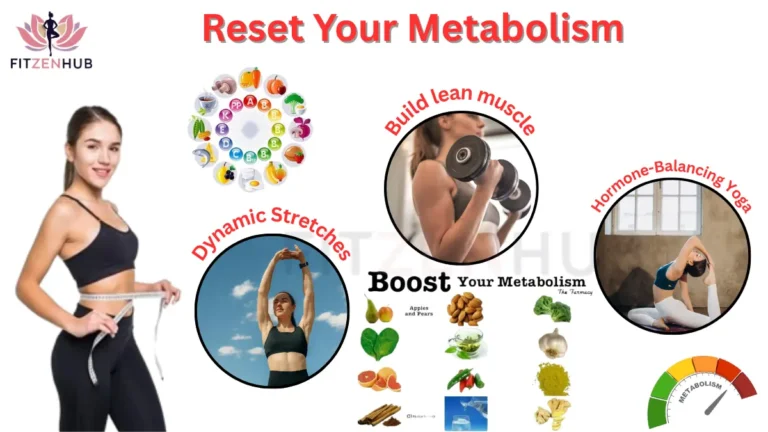Feeling off, bloated, or exhausted? These 10 surprising habits could be silently wrecking your hormonal balance. Discover what no one’s telling women—and how to reset naturally for energy, clarity, and calm.
🧬 Introduction: Why Hormonal Balance Is Everything
Hormones control nearly every function in a woman’s body — from mood and metabolism to skin, energy, weight, and reproductive health. But what if your daily “normal” routines are silently sabotaging your balance?
Many women struggle with symptoms like:
- Constant fatigue
- Weight gain (especially around the belly)
- Mood swings or anxiety
- Irregular periods or acne
- Low libido or sleep issues
Instead of reaching for a quick fix, it’s time to look deeper. Let’s expose the 10 shocking habits you may be doing every day that are silently throwing your hormones out of whack — and what to do instead.
⚠️ 1. Skipping Breakfast — or Having the Wrong One
Many women either skip breakfast or grab a carb-heavy meal (like cereal, toast, or coffee alone). This causes a spike in cortisol and insulin, setting the stage for hormonal chaos.
🚫 The Problem:
- Spiking blood sugar → crashing later
- Signals the body that food is scarce → stress response
- Worsens PMS, PCOS, and insulin resistance
✅ Better:
Start with protein + healthy fat. Examples:
- 2 boiled eggs + avocado
- Greek yogurt + chia + walnuts
- Protein smoothie with flaxseed
☕ 2. Too Much Caffeine — Especially on an Empty Stomach
Caffeine gives a quick energy hit, but it also spikes cortisol, your primary stress hormone.
🚫 The Problem:
- Triggers adrenaline & anxiety
- Disrupts estrogen and thyroid function
- Impacts sleep and menstrual cycles
✅ Better:
- Delay coffee by 90 mins after waking
- Add collagen or healthy fats to slow absorption
- Try matcha or herbal adaptogenic teas
🌙 3. Poor Sleep Routine (Less Than 7 Hours or Irregular Sleep)
Your body resets hormones while you sleep. Especially melatonin, growth hormone, and leptin (your appetite hormone).
🚫 The Problem:
- Lowers insulin sensitivity
- Raises cortisol and ghrelin (hunger)
- Worsens mood, acne, cravings
✅ Better:
- Sleep 7–9 hours
- Sleep before 11 PM for best hormone repair
- Use magnesium glycinate or tart cherry juice for support

🍷 4. Weekend Alcohol Bingeing
Even occasional drinking can disrupt estrogen metabolism and liver detox pathways.
🚫 The Problem:
- Liver gets busy clearing alcohol → estrogen builds up
- Causes estrogen dominance (PMS, fibroids, mood issues)
- Lowers progesterone
✅ Better:
- Limit to 1 drink/week
- Support detox with cruciferous veggies (broccoli, kale)
- Add DIM or milk thistle if needed
🍫 5. Emotional Sugar Snacking
Craving sugar during stress or PMS is common, but it creates a blood sugar rollercoaster that inflames hormone-producing glands.
🚫 The Problem:
- Raises insulin → affects ovaries
- Depletes magnesium → worsens cramps and sleep
- Increases androgens → acne, PCOS
✅ Better:
- Eat fruit with protein (banana + almonds)
- Use dates + cacao for healthy treats
- Supplement chromium and cinnamon for sugar control
📱 6. Excessive Screen Time (Blue Light Overload)
Blue light from phones/laptops suppresses melatonin, messes with your circadian rhythm, and raises cortisol.
🚫 The Problem:
- Poor sleep = poor hormonal repair
- Cortisol dominance = weight gain, fatigue
- Disrupts reproductive cycles
✅ Better:
- No screens 1 hour before bed
- Use blue light glasses
- Try red-tinted apps like “Twilight” or “Flux”
💊 7. Overusing Birth Control Without Addressing Root Cause
While hormonal birth control can be useful short-term, it can mask the root causes of imbalance — and even create long-term depletion.
🚫 The Problem:
- Shuts down ovulation → no natural hormone rhythm
- Depletes B-vitamins, magnesium, zinc
- Leads to post-pill acne, anxiety, gut issues
✅ Better:
- Use non-hormonal options like copper IUD or Daysy tracker
- Heal gut, liver, and nutrient stores before quitting
- Work with a women’s health naturopath if transitioning off
🧴 8. Using Toxic Skincare and Home Products
Your skin absorbs what you apply. Many personal care and cleaning products contain endocrine disruptors like parabens, phthalates, and BPA.
🚫 The Problem:
- Mimic estrogen → estrogen dominance
- Interfere with thyroid function
- Slow detox and fertility
✅ Better:
- Use EWG-verified clean beauty products
- Avoid plastic containers, use glass/stainless
- DIY natural deodorants and cleaners
😰 9. Chronic Low-Grade Stress — You’re Always “On”
From emails to multitasking to rushing — women often operate in chronic stress mode, activating fight-or-flight 24/7.
🚫 The Problem:
- Cortisol steals from progesterone
- Messes with thyroid, libido, and ovulation
- Fatigue, anxiety, hair loss
✅ Better:
- Take 10-minute breaks every 90 mins
- Practice deep breathing, EFT tapping, or yoga nidra
- Adaptogens like ashwagandha or holy basil can help
🧬 Hormone Disruptor Risk Score
🧂 10. Not Eating Enough — Especially Healthy Fats
Many women still fear fat or under-eat, which sends the body into starvation mode.
🚫 The Problem:
- Hormones are made from fat and cholesterol
- Under-eating = thyroid slows down
- Missed periods, brittle nails, low libido
✅ Better:
- Add avocado, nuts, ghee, olive oil daily
- Eat 3 balanced meals, avoid restrictive diets
- Prioritize nourishment over deprivation
💡 Bonus: How to Reset Your Hormones Naturally (Daily Rituals)
Here’s a simple daily hormone-balancing routine to try:
| Time | Ritual |
|---|---|
| Upon waking | Warm lemon water + 5-minute stretch |
| Breakfast | Protein + healthy fat meal |
| Midday | Sunshine + deep breathing |
| Afternoon | Magnesium-rich snack + herbal tea |
| Evening | No screens + calming adaptogen tea |
| Before bed | Gratitude journaling + 7-8 hrs sleep |
✅ Sources:
- Harvard Health Publishing – Hormones and health
- Cleveland Clinic – Hormonal Imbalance in Women
- National Institutes of Health – Environmental Impact on Hormonal Health
- Mayo Clinic – Women's Hormonal Disorders
- Endocrine Society – Hormone Health Network
📌 Final Thoughts: Awareness Is Power
You don’t need to overhaul your life overnight. But if you’ve been feeling off lately, your daily habits might be the missing puzzle piece.
Every small choice — what you eat, how you move, when you sleep — speaks to your hormones.
🧠 Awareness + consistent action = balanced hormones, radiant skin, better moods, and a stronger body.
🧠 FAQs
Q1. How do I know if I have a hormonal imbalance?
Fatigue, weight gain, irregular periods, acne, mood swings, and low libido are common signs. Get lab tests (like estrogen, progesterone, cortisol) to confirm.
Q2. Can hormonal imbalance cause mental health issues?
Yes — low progesterone, high cortisol, or estrogen dominance can trigger anxiety, depression, and brain fog.
Q3. How long does it take to balance hormones naturally?
With consistent diet, lifestyle, and sleep habits, most women start seeing results in 6–12 weeks.
Q4. Which foods trigger hormonal imbalance?
A4. Sugar, processed carbs, trans fats, dairy (for some women), and soy-based products can contribute to hormonal disruptions.
Q5. Are hormonal imbalances reversible?
A5. In most cases, yes! With lifestyle changes, balanced nutrition, sleep hygiene, and stress management, hormonal health can improve significantly.







